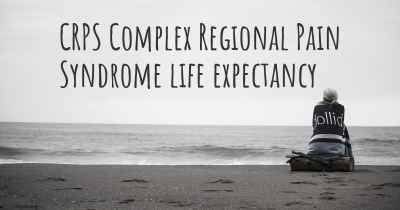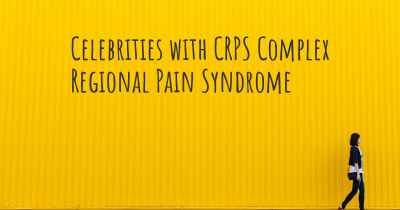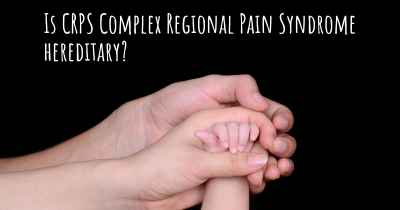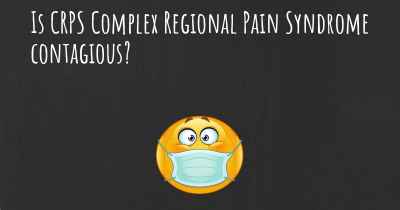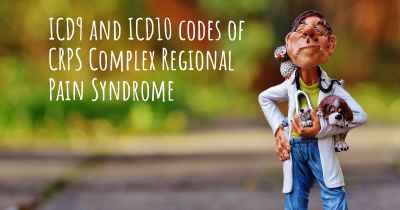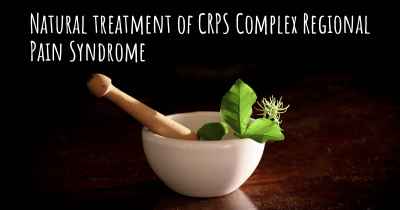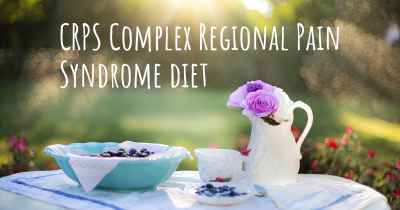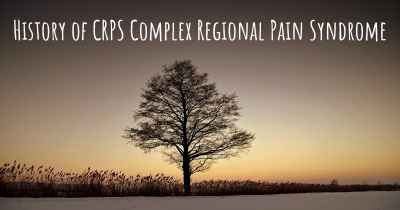7
Living with CRPS Complex Regional Pain Syndrome. How to live with CRPS Complex Regional Pain Syndrome?
Can you be happy living with CRPS Complex Regional Pain Syndrome? What do you have to do to be happy with CRPS Complex Regional Pain Syndrome? Living with CRPS Complex Regional Pain Syndrome can be difficult, but you have to fight to try to be happy. Have a look at things that other people have done to be happy with CRPS Complex Regional Pain Syndrome
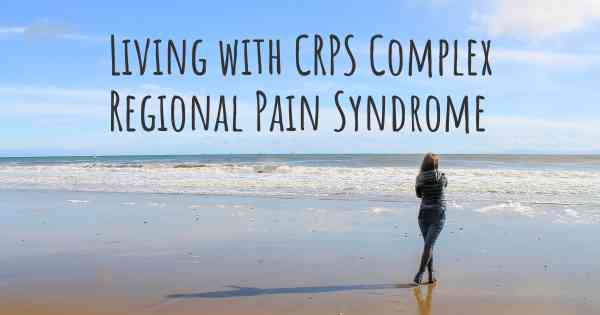
Yes you can be happy with this disease. We may not have many good days but we can be happy. With this it's the little things that make us happy like improvement.
Posted Apr 20, 2017 by Chloe 1000
You can't always be happy living with CRPS. It is very hard to be happy when you can't walk and you have a tremendous amount of pain. However, there are people out there to help. I thought of ending my life on multiple occasions. When I was in the throws of the intense pain and I came to grips with the fact that that this disease is forever, I hit rock bottom. But you know what, suffering is otherworldly. You have such a unique perspective as a CRPS patient. You can now know what it's like to have extreme pain all the time. You can feel other peoples suffering. Normal human beings walk down the street to the store are just fine. So when you, you who can barely walk get to the store, you've accomplished something amazing! Everything you do is now amazing! Everybody else is just ordinary, but the things you do with what you're going through...is simply extraordinary. Wear that as a badge of honor.
Posted May 9, 2017 by Jon 1100
You can be happy. Be positive. You are not the problem, the pain is.
Surround yourself with good support people and programs. An understanding of what is happening is vital.
Surround yourself with good support people and programs. An understanding of what is happening is vital.
Posted Sep 6, 2017 by [email protected] 5060
I am not sure about happy by the normal use of the word. I think you have to keep trying and hoping for your pain to get better
Posted Sep 11, 2017 by Craig 1600
Its tough. You have to accept and learn to make the most of life. Positivity is a necessity. .
Posted Sep 13, 2017 by Andy 3550
CRPS is sometimes called The Suicide Disease because of the sense of hopelessness that comes with unrelenting, excruciating pain. It is critically important that people with CRPS find ways to support their mental, emotional and spiritual health. Here are a few ways I believe this can be done:
1. Create a support network.
People with CRPS often rely heavily on family members and friends for help with activities they can no longer do. Nurturing these relationships, sharing information and personal feelings, and being gracious when others do not understand will prevent burning out these resources. Have literature available (the RSDA.org website is very helpful) that explains your condition in ways you cannot. Give your caregivers and family information on support groups dedicated to them. Don't expect what someone cannot give. If they are not naturally empathetic, don't expect them to be kind and affirming when you're in a flare. If they have never experienced serious pain, don't expect them to understand all the ways it affects your body and soul. Find people who are empathetic and kind - as many as you can, and be willing to ask for help when you need it.
2. Nurture a spiritual life. Whatever your personal belief system, seek to go deeper spiritually to find hope, peace, and serenity in the moments that are hard. Spiritual direction is a powerful tool in examining and developing your inner life and relationship with the Divine. Spiritual practices such as reading, prayer, journaling, meditation, and others are vital tools and resources. If you are part of a faith community, find ways to keep involved and in touch. Let them pray for you, and use your gifts to contribute as you can. Often our sense of purpose comes from our spiritual life, and purpose can be fulfilled even by people living with a condition as awful as CRPS.
3. Strengthen your mental and emotional health. Journaling is a wonderful tool to track your thoughts and emotions and become more objective, something that is important when living with chronic pain. Mindfulness meditation can empower you to separate your emotional response to pain from the physical sensation, making the pain easier to manage. Cognitive behavioral therapy is highly useful in learning to identify and challenge negative and destructive thoughts that lead to anxiety and depression.
Being vigilant about creating and maintaining a healthy inner life will allow someone living with the pain of CRPS to be happy, productive and fulfilled.
1. Create a support network.
People with CRPS often rely heavily on family members and friends for help with activities they can no longer do. Nurturing these relationships, sharing information and personal feelings, and being gracious when others do not understand will prevent burning out these resources. Have literature available (the RSDA.org website is very helpful) that explains your condition in ways you cannot. Give your caregivers and family information on support groups dedicated to them. Don't expect what someone cannot give. If they are not naturally empathetic, don't expect them to be kind and affirming when you're in a flare. If they have never experienced serious pain, don't expect them to understand all the ways it affects your body and soul. Find people who are empathetic and kind - as many as you can, and be willing to ask for help when you need it.
2. Nurture a spiritual life. Whatever your personal belief system, seek to go deeper spiritually to find hope, peace, and serenity in the moments that are hard. Spiritual direction is a powerful tool in examining and developing your inner life and relationship with the Divine. Spiritual practices such as reading, prayer, journaling, meditation, and others are vital tools and resources. If you are part of a faith community, find ways to keep involved and in touch. Let them pray for you, and use your gifts to contribute as you can. Often our sense of purpose comes from our spiritual life, and purpose can be fulfilled even by people living with a condition as awful as CRPS.
3. Strengthen your mental and emotional health. Journaling is a wonderful tool to track your thoughts and emotions and become more objective, something that is important when living with chronic pain. Mindfulness meditation can empower you to separate your emotional response to pain from the physical sensation, making the pain easier to manage. Cognitive behavioral therapy is highly useful in learning to identify and challenge negative and destructive thoughts that lead to anxiety and depression.
Being vigilant about creating and maintaining a healthy inner life will allow someone living with the pain of CRPS to be happy, productive and fulfilled.
Posted Sep 15, 2017 by DrLisa 3750
Remain determined not to let it beat you. Do what you enjoy doing and try to lead as normal a life as possible and practical given your circumstances
Posted Sep 19, 2017 by Alex 2550
Don't give up!
Don't let this disease win!
When your in constant pain it's easy to give up and not want to do anything. You have to learn to do other things. You have to learn a new life and it can be hard.
There are a lot of amazing support groups, clubs on line. You have to keep going.
Don't let this disease win!
When your in constant pain it's easy to give up and not want to do anything. You have to learn to do other things. You have to learn a new life and it can be hard.
There are a lot of amazing support groups, clubs on line. You have to keep going.
Posted Oct 8, 2017 by Valerie 1500
Find a doctor that specializes in this disease! Don’t waste your time with doctors who don’t see patients with crps regularly
Posted Nov 11, 2017 by Robbie 2000
One thing that everyone needs with this disease is support! Whether you have family and friends that are there for you to listen to you, take you to doctors help you when your pain gets uncontrollable. Unfortunately a lot of us have family but after a while seem to be there less and less. Several lose family and friends because of this disease which if hard to believe. Get on a support group there are numerous and they really help to learn what is happening, medicines that are helping others, doctors and clinics that know about CRPS. Unfortunately most doctors and nurses do not know anything about CRPS. The groups are wonderful to have people that really know what you are saying about your pain and how bad it is. Help educate others!! We need everyone to know about this disease so we can finally get a cure or at least help.
Also something I am doing to seeing a psychiatrist. Someone to listen about what I’m going through at home. With people making comments like it can’t be that bad. That’s all she talks about. CRPS is called the suicide disease for many reasons. Only people that have it truly understand!
Also something I am doing to seeing a psychiatrist. Someone to listen about what I’m going through at home. With people making comments like it can’t be that bad. That’s all she talks about. CRPS is called the suicide disease for many reasons. Only people that have it truly understand!
Posted Nov 11, 2017 by Joey7807 1000
While we may not enjoy the life we have been dealt, we still have a life to live. We have family and friends here as well. One day at a time is what we can do, we have to make the best of what we have and make it work for us! We improvise, adapt then we begin to overcome. Find things that work for is us build on that. Don’t ever give up or quit on yourself. Reach out and talk! Sharing is healing ‘
Posted Nov 11, 2017 by Aj 2000
Find a good support group, don't give up hope, have a positive attitude a negative one only makes it worse. Do something to better the world and feel value of your life.
Posted Nov 12, 2017 by Shanna 5000
Find a good doctor and a good support system who are willing to help you when needed.
Posted Nov 12, 2017 by ladyff1481 2050
Living day to day is a struggle you will have to find new ways to do things and how long you are able to do them. Everyone is different so what some else can do someone else may not be able to do.
Posted Nov 13, 2017 by James 800
Happy? Not easy to do initially. This disease will turn your world inside out. It will make you examine every relationship you have, including with yourself. Its important not to be hard on yourself, but don't be lax either. Only you decide your fate with this disease. Choosing to be active in your treatment plan and working towards controlling your symptoms instead of your symptoms controlling you is the only way to have a life again.
Posted Nov 13, 2017 by Thea 3150
Accept your new life & it's possible limitations, surround yourself with positive, encouraging people (there are some great closed/private groups on Facebook, too). Let your friends & family know as much about your new limitations, etc as possible. Try to avoid becoming stressed- it leads to very painful flares
Posted May 15, 2018 by Tammy 800
Avoid stress avoid exercises that cause pain flares.Acept your ability.Enjoy the support given by family and friends.rest if you must ,avoid pushing yourself over the top. Grieve as long as you need to.Keep mentally active.
Posted Oct 25, 2018 by Misty 2100
Alway's try to remember to not be ashamed that you aren't able to be and do what you used to. Keep trying, believe you are strong! And maybe....Get a dog!!!!! They love you unconditionally!
Posted Nov 1, 2018 by Judy 3000
A very good medical team and a very good family support group at home. Seek treatments for it as soon as possible and be proactive in your care and treatments. Talk about it and often!
Posted Jan 5, 2019 by Cynthia 4000
This illness can be isolating but you need to fight this as much as possible and reach out to family and friends.
Ask for help when need it and learn to accept it with cheerful heart.
And look for new opportunities to explore new hobbies or volunteer.
May not be able to work. But reaching out even in tiny bit to others with lift up your spirits also.
Look for humor in life as well. Humor is good medicine as the Word tells us.
See a joke share the laughter.
Ask for help when need it and learn to accept it with cheerful heart.
And look for new opportunities to explore new hobbies or volunteer.
May not be able to work. But reaching out even in tiny bit to others with lift up your spirits also.
Look for humor in life as well. Humor is good medicine as the Word tells us.
See a joke share the laughter.
Posted Jan 16, 2021 by Patricia 3050
Find great doctors who know how to help you manage your pain. Don't be afraid to take a day off and let your body rest. Take your pain seriously. You are valid. Your symptoms are valid. Please don't invalidate yourself.
Posted Mar 29, 2021 by Sage0920 2000
Pace not race. Know your limits. The boom and bust cycle is all too common. You may feel great one day so ypu throw all your energy into something and then find yourself in bed for the next 3 days. Very hare and tortoise. Nothing wrong in being.kind to.yourself
Posted Nov 3, 2022 by Heather 5020
Translated from portuguese
Improve translation
It is very complicated.
Living with excruciating pain,is not easy. I have support from psychiatry, orthopaedics, neurology. I walk on crutches 8 years and I have operated 16 x.
You have to learn to disregard the pain, try to make life as normal as possible, to the extent possible. Never stop fighting.
Learn to live with the pain... Never give up!!!
Living with excruciating pain,is not easy. I have support from psychiatry, orthopaedics, neurology. I walk on crutches 8 years and I have operated 16 x.
You have to learn to disregard the pain, try to make life as normal as possible, to the extent possible. Never stop fighting.
Learn to live with the pain... Never give up!!!
Posted Oct 29, 2017 by Isabel 500
